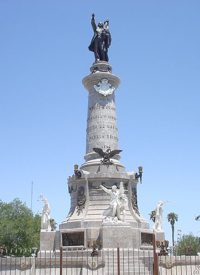
As cartel-related violence continues virtually unabated in Mexico’s Ciudad Juárez, thousands of police officers in that city of 1.3 million people have fled their homes and now must live in hotels to conceal their identity. The government-funded relocation follows a month in which eight police officers were murdered as part of a systematic campaign by one of the cartels to attempt to force the resignation of the city’s police chief. Banners around the city have threatened the death of a police officer a day until Police Chief Julian Leyzaola resigns his office.
A story at BorderlandBeat.com reported that on January 25, “At least a dozen banners” appeared around Ciudad Juárez that morning, threatening the police chief and his officers:
This is for Leyzaola. If you continue supporting the imitators and only arrest our people we will kill one officer daily so that the citizens will know how corrupt you are. Leyzaola = a criminal with a badge. Sincerely, Nuevo Cartel de Juárez
By the time of the posting of the banners, five police officers and a Chihuahua state prosecutor had already been killed during the month of January.
Cartel-related violence has been virtually out of control for several years in Ciudad Juárez, and cartel activities regularly spill over the border into the neighboring city of El Paso, Texas.
The city’s response to the threat was swift: all 2,500 police officers were moved out of their homes and into hotel accommodations as part of an effort to conceal their location. An article for Fox News Latino highlights the expense and impact which the sudden relocation is having of the city’s police force:
Police spokesman Adrian Sánchez said officers were ordered to stay away from their houses after Monday’s shootout between assailants and policemen. …
The city’s government said it has secured 26 million pesos ($2 million) to house officers in hotels but did not specify how long that would last.
A policewoman who moved to a hotel in downtown Juárez said Wednesday that officers feel "more like soldiers, living in barracks than police officers." Still, she said, "I don’t want my family to become collateral damage if I become a target."
Obviously, the life of law enforcement officers and their families is often stressful, and a campaign undertaken by a drug cartel to systematically slaughter those officers is simply the latest development in a drug war which has torn Mexican society apart. The relocation of officers away from their families has thus far proven successful in stopping any more of them from being killed. Those who were targeted during January’s violence were all murdered on their way to or from home.
At present, Leyzaola is refusing to resign as police chief. According to Leyzaola, Johnny “El Tin Tan” Morales Gonzalez — a member of the New Juárez Cartel — is behind the series of attacks. The El Paso Times reports that following the most recent attack — a firefight which resulted in the death of three suspects, the arrest of three others, and the wounding of three police officers — the city government decided to publicly release the information regarding Morales:
Juárez Mayor Héctor Murguía said the purpose of releasing Morales’ identity was to encourage citizens to report any information about Morales’ whereabouts to local authorities.
Also, Murguía said city officials have managed to pinpoint nine criminal cells that might be behind the attacks against police officers. He did not elaborate.
As for the funds used for housing police officers, the mayor explained that those funds were being reallocated from other public projects:
"I have no choice," Murguía said. "Due to several attacks against Juárez police officers, where some of them have died, they have been sheltered in several motels." Police officers have been directed to wear plain clothes when their shifts end and carry their weapons home.
Monday’s shootout follows a fatal trend against police officers here that has left eight of them slain so far this year.
"Juárez officers are still doing their jobs, at the expense of their own lives, to serve and protect the community," Murguía said.
"Those (officers) who are afraid to die in the line of duty must quit the police force,² he said. "We don’t need them."
The Associated Press reports that the murder rate has decreased in Ciudad Juárez since Leyzaola became the city’s police chief. (His predecessor quit in 2009 after being threatened.) In 2010, there were more than 3,000 murders in the city, but in 2011 that number dropped to more than 1,900. However, by almost any standard, the murder rate is still unbelievably high.
An article for Fronteras (“Is Violent Juárez Truly Getting Safer?”) details the significant increase in violent crime which is still readily in evidence:
Professor Hector Padilla, who teaches political science at the Autonomous University of Juárez, agrees. He said the idea that things have gotten better is more illusion than truth.
"There’s a problem," he said. "During the last four years, the murder rate has been rising, then in 2011, there was a drop. But it’s still much higher than the average five years ago."
In 2007, before the wave of violence hit the city, there were 320 murders in one year. By 2010 that number reached more than 3,000. Last year, the killings went down to about 2,000.
Another ongoing problem Padilla highlights is that very few people are convicted of their crimes in Juárez and throughout Mexico.
"As long as those responsible for these crimes are still out there, this (extreme violence) could return at any moment," he said.
As reported for The New American in November 2010, less than two percent of violent crimes are ever punished by courts in Mexico. With the lack of any meaningful deterrent to future criminal activity, is it any wonder than the murder rate has remained to high? And the Mexican cartels are easily infiltrating American society by means of illegal immigration; in Texas, the cartels are already recruiting American children to serve their criminal activities. Regardless of any short-term developments in the situation in Ciudad Juárez, the larger issues of cartel crime and violence throughout Mexico and the southern United States continue to need to be addressed.
Photo: Monument to Benito Juárez


